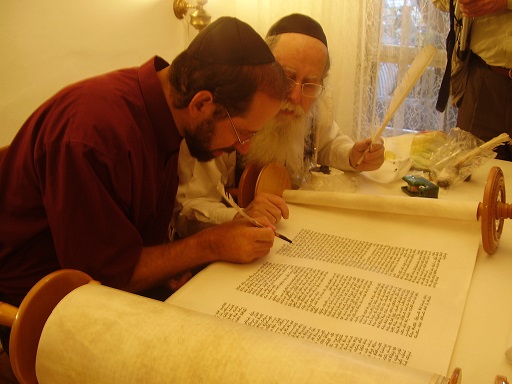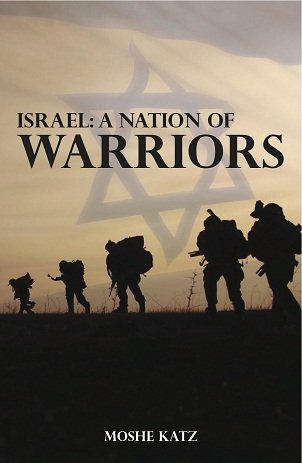- Home
- Krav Maga Blog
- Krav Instructors
- Train in Israel
- Tour Train Israel
- Krav Shop
- DVD
- Kickboxing
- IKI Near Me
- Seminars
- IKI Membership
- On-Line Training
- Krav Maga Training
- Testimonials
- History Krav Maga
- Instructors Page
- Past Blogs
- Spanish
- Italian
- Certification
- Contact
- Holland Seminar
- Vienna Seminar
- Poland Seminar
- Italy Seminar
- Belt Requirements
Lessons from Sinai
By Moshe Katz, Krav Maga Instructor, Israel

This special ancient book contains many life lessons for all people.
This particular scroll was written in memory of IDF soldier Philip Moscow, killed during the Second Lebanon War. I tell his story in my book, (below).
Respect! Give it, take it, earn it. R - E - S - P - E - C - T!
The topic of respect is a controversial one. It is different from culture to culture, from generation to generation and even in different settings.
The question comes up with instructors, commanders, a boss at work. How much respect is required to get the job done, how much respect is appropriate, is there such a thing as demanding too much respect.
There are instructors who I feel go overboard. Years ago my sales agent at a martial arts supply company told me that some instructors insist on being called "Sensei" by their sales agent!
Outrageous. She tried telling them, "I am not your student, and this is not your dojo". Another karate instructor saw a student in a bar, she was smoking, he slapped the cigarette out of her mouth. She did not know how to respond.
Some instructors are too demanding when they show up for a seminar. I have heard stories of instructors demanding fancy dinners, 3 different bottles of wine after dinner, a cheese cake and then to be taken to a show. How much respect is due? When it is too much?
In the Israeli army there is a period where "distance" is created, but then a period when "distance is broken".
What is the appropriate distance? How much respect is required?
Perhaps we can learn a lesson from the story of Mount Sinai.
When I was younger I heard this lesson from the late Rabbi M. Kahane, and I believe the lesson originated with the Gerrer Rebbe, (the great Rabbi from town of Gur - Góra Kalwaria, a small town in Poland).
The people of Israel were to be given the greatest gift of all, the gift of life, The Torah, the laws to live by for a good life. Location was important. Location, location, location. And the location chosen was Mount Sinai.
The rabbis ask: Why was Mt. Sinai chosen of all the mountains? What was so special about it?
They answered that Mt. Sinai was chosen because it is a modest mountain, it was not very tall. A taller mountain could have been chosen, many mountains are taller, grander, than Mt. Sinai. But Mt. Sinai was chosen to teach us humility.
Of all the great and tall mountains God chose a small mountain, a modest mountain, to teach us humility, to remember to be humble at all times.
But then, the rabbis ask, if the lesson is humility, surely a valley would be a better choice? What can be lower than a valley? A low valley should have been chosen as the location to give the Torah to Israel.
Listen please to the answer
A valley was not chosen because it is too humble. Do not be so humble as to let everyone walk all over you. Be a mountain, tall and proud, but be a humble mountain, like Mt. Sinai.
As we go through life, life will humble us. It will teach us many lessons, it will remind us how small we truly are. But yet, it will also remind us that we have much to be proud of and we are deserving of respect.
Stand up for yourself, be a mountain! But do not go overboard, be a modest mountain.
The rabbis say If someone has taught you one lesson, one verse, you must always treat them with the respect due a teacher. A teacher is viewed as a parent, as one who gave you life. You must always show respect. But respect must be mutual, the teacher must also respect the student. He is a student, not a slave, he too has dignity.
Years ago a rabbi came to Israel. I was honored by his visit and spent the day driving him around. The next day he had to return home and I offered to take more time off of my work and drive him to the airport. He refused.
I repeated my offer, and said, "But rabbi, I insist, you will not take a taxi, I will drive you."
He accepted.
And then he said the following: "Allow me to explain what just happened. It was right of you to offer, it was right of me to refuse, and it was right of you to insist. Then it was right of me to accept."
His lesson here was, it was correct of me to offer the rabbi a ride. But it would have been wrong for him to assume that as his right. It was correct of him to refuse, thus saying...I am not so great that you should take another day off of work for me.
But he is a rabbi, a teacher, so it was correct of me to insist. In other words I was saying, "Yes, I appreciate you not wanting to trouble me, but I need to do this."
And then for him to refuse it again would be being the Valley, being too humble. He accepted, thus remaining the mountain, a modest mountain.
Stand tall but not arrogant, Be a mountain, but a modest one, like Mt. Sinai.
Israel: A Nation of Warriors
e Book by Moshe Katz

Biblical fighting, what was it like?
What weapons did they use? What kind of tactics.
Who were the great Hebrew warriors and how is their tradition being carried on today?
Israeli - Hebrew fighting throughout the age; Abraham, Moses, Joshua, Samson, their mindset and their fighting skills.
Over 250 pages, the history of Israel and the Jewish people as a fighting nation from the days of Abraham to our own times. The book covers the history and roots of Krav Maga and the modern Israeli Defense Forces. The book analyzes what makes Israeli security the best in the world.
(cover by Arie Katz)
$9.99 on Kindle
Israel, A Nation of Warriors on Kindle